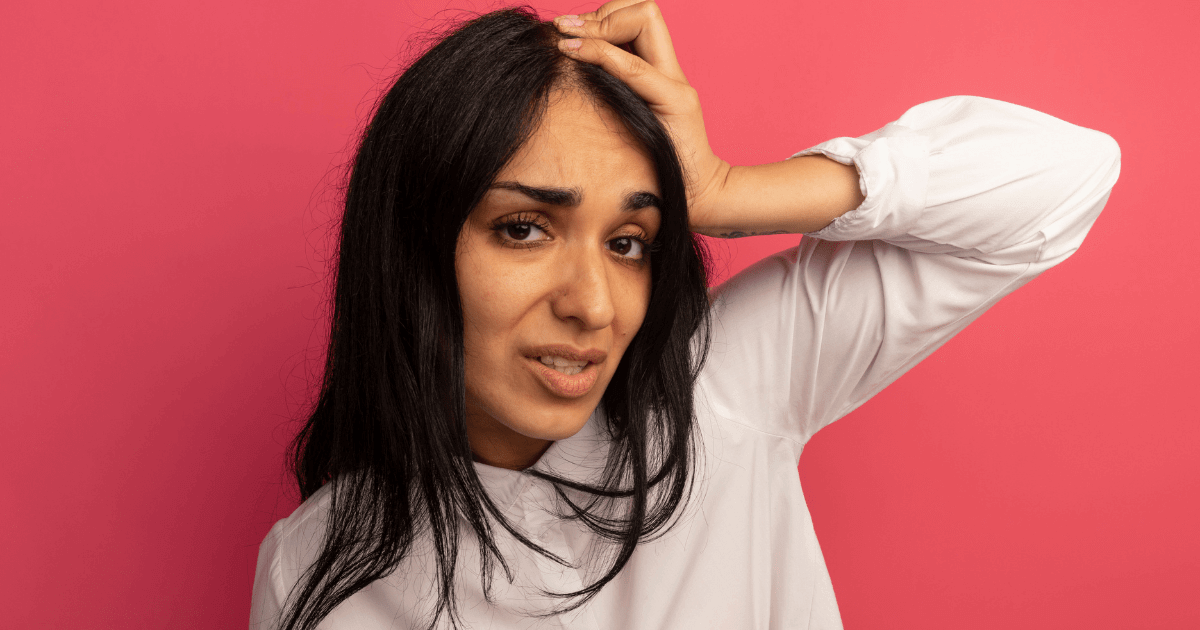A very common problem with long-hair is when the scalp hurts when moving hair. Also known as scalp tenderness, scalp hurting when moving hair causes discomfort, burning or tingling sensation that directly originates from the nerves on your scalp. Triggering the blood vessels in the skin of your scalp, scalp hurts due to inflammation. It exerts pressure on the surrounding nerves resulting in the sensitivity and a strong pulling on your head.
There could be underlying scalp issues or even external causes that might affect and cause scalp hurt when moving hair. It is important to throw light on the potential causes causing the discomfort and finding relief to it.
In this article, we’ll focus on the causes and the quick remedies for scalp tenderness or scalp hurting while moving hair. Let’s delve into the details now.
Causes
The cause of scalp hurt while moving hair could be due to many reasons. It becomes increasingly important to understand the cause of scalp tenderness while moving hair. Better to get a consultation with a healthcare professional. Addressing the underlying issue results in finding effective relief, promoting overall scalp health.
Here are some of the key causes leading to scalp hurting when you are moving your hair –
1. Tightened Hairstyles
Wearing hairstyles that exert tension on the scalp, such as tight ponytails or braids, can lead to discomfort and pain. When you open your hair and move to the other side, you may feel the pain.
2. Scalp Inflammation
Scalp inflammation is often taken under conditions like if you are suffering from scalp psoriasis or dermatitis. This may result in extreme sensitivity and pain when the hair is moved.
3. Traction Alopecia
Excessive pulling or tension on the hair follicles, commonly due to tight hairstyles, can lead to a condition known as traction alopecia, causing scalp pain.
4. Fungal or Bacterial Infections
If you are having Fungal or bacterial infections of the scalp, like folliculitis, it may result in tenderness and pain when manipulating the hair.
5. Sunburn or Windburn
Prolonged exposure to the sun or harsh winds without adequate protection can lead to scalp irritation and pain. This may even result in a headache.
6. Allergic Reactions
Many people get allergies to hair care products or dyes that can cause inflammation and discomfort on the scalp. When you try to move your hair from one side to another, you may feel discomfort.
7. Stress or Tension
Underlying emotional stress or tension can manifest physically, leading to scalp muscle tension and pain.
8. Head Lice
Infestation caused by head lice can cause itching and tenderness on the scalp, especially when moving the hair.
9. Underlying Medical Conditions
Certain medical conditions, such as fibromyalgia or chronic headaches, may also manifest with scalp pain. You will even experience the most while tying or moving your hair.
It’s essential to identify the specific cause of scalp pain through consultation with a healthcare professional. Addressing the underlying issue is key to finding effective relief and promoting overall scalp health.
Remedies
1. Herbal Rinses
- Use herbal rinses like chamomile or green tea to soothe scalp irritation.
- Brew the herbs, let them cool, and apply the infusion to the scalp after shampooing.
2. Apply Aloe Vera Gel
- Apply pure aloe vera gel to the scalp to reduce inflammation, soothing discomfort.
- Ensure it’s free from added fragrances or alcohol.
- You may even purchase a pure aloe vera gel from the store.
3. Apple Cider Vinegar Rinse
- Dilute apple cider vinegar with water. The ratio is supposed to be 1:2.
- Use it as a final rinse after shampooing.
- It can help balance pH levels and reduce scalp irritation.
4. Oatmeal Mask
- Take oatmeal and ground it in powder form. Oatmeal helps in reducing inflammation.
- Create a paste using finely ground oatmeal and water.
- Apply it to the scalp.
- Leave it on for 10-15 minutes, then rinse thoroughly with cold water.
- Do this twice a week.
5. Proper Nutrition
- Ensure a balanced diet rich in nutrients like vitamins A, C, E, and omega-3 fatty acids.
- Nutritional deficiencies can contribute to scalp issues.
6. Gentle Hair Care
- Use a mild, sulphate-free shampoo and conditioner to avoid further irritation.
- Be gentle while washing and detangling hair to minimise stress on the scalp.
7. Avoid Tight Hairstyles
- Opt for loose hairstyles to reduce tension on the scalp.
- Avoid using hair ties or accessories that pull tightly on the hair.
- Try using hair scrunchies which are made of silk to cause less hair fall or scalp hurting.
8. Scalp Massage
- Gently massage the scalp every night for at least 5 to 10 minutes.
- This helps in improving blood circulation in addition to relieving tension.
- You may try using natural oils, such as coconut or jojoba oil, during the massage.
9. Moisturize Your Scalp
- Keep the scalp moisturised and hydrated especially in dry or cold weather.
- Use a scalp-friendly moisturiser or natural oils and conditioner to prevent dryness.
10. Cool Compress
- Application of a cool compress to the scalp helps reduce scalp inflammation while soothing the pain.
- Avoid hot water when washing your hair, as it can exacerbate irritation.
10. Stress Management
- Practice stress-reducing techniques, such as deep breathing, meditation, or yoga.
- Ensure an adequate amount of sleep to promote overall well-being.
If the pain still persists or you are seeing accompanied symptoms, immediately consult a healthcare professional for a thorough examination and diagnosis.
Conclusion
Scalp tenderness is a growing problem these days among both men and women. However, using home remedies mentioned above are commonly used and result oriented. We would suggest to speak to your doctor if your scalp that isn’t going away even after using these remedies.
FAQs –
Why does my hair hurt at the root when I move it?
You may experience hair hurting due to many reasons. It might be triggered from tension, scalp inflammation (psoriasis, dermatitis), allergic reactions, infections, stress, or sun exposure. Opting for home remedies mentioned above or a consultation helps diagnose and treat the underlying cause for relief.
Is it normal for your scalp to hurt when you move your hair?
Having occasional scalp tenderness when moving hair isn’t uncommon. Often it results due to tight hairstyles, scalp conditions, stress, or minor inflammation. If the issue persists, you need an expert consultation.
What to do if my scalp hurts when I move my hair?
There are some easy home techniques to reduce scalp hurting when moving your hair. This includes avoiding tight hairstyles, using gentle hair care products, scalp massages with natural oils, applying cool compresses, consulting a dermatologist for scalp conditions, and stress management at home.
How do I stop my hair roots from hurting?
Relieve hair roots from hurting by avoiding tight hairstyles, using mild hair care products, applying scalp massages with gentle pressure, opting for natural oils, keeping stress in check, and seeking dermatological advice if pain persists.
How do you fix scalp pain?
There are ample home remedies that have been mentioned to avoid the scalp pain. If it still persists, it is highly recommended to consult a dermatologist to know the underlying cause and get relief.




